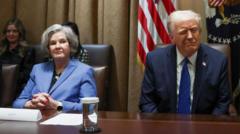A federal appeals court has temporarily halted a lower court decision declaring several tariffs imposed by President Trump as illegal, allowing his administration to keep tariffs on nations, including China, Canada, and Mexico, for now.
Trump Secures Temporary Relief for Tariffs Amid Legal Battles

Trump Secures Temporary Relief for Tariffs Amid Legal Battles
President Trump's administration claims a short-term victory in court to maintain tariffs on trade partners while navigating complex legal challenges.
President Trump faced a significant courtroom challenge yesterday as he sought to retain the extensive tariffs placed on China and other trading partners, which have become a cornerstone of his administration's trade policy. The legal landscape shifted dramatically when a federal court ruled many of these tariffs unconstitutional, presenting a considerable hurdle for Trump's trade agenda. However, the administration quickly found relief with an appeals court that temporarily froze the lower court's decision, granting Trump the ability to continue imposing these tariffs.
This temporary reprieve permits Trump to uphold tariffs against China, Canada, and Mexico, as well as to threaten additional “reciprocal” tariffs that were previously announced but suspended earlier this month. This ongoing legal saga, however, is far from resolved, as the case is poised to reach the Supreme Court, which will ultimately determine the legal fate of these trade practices.
The reaction to this legal development has been widespread, causing uncertainty among trade experts and international partners. Over a dozen nations are currently engaged in negotiations with the Trump administration, which has demanded reductions in tariffs and trade barriers on American goods as a condition for lowering its own tariffs.
The judiciary has increasingly emerged as a critical check on the executive branch, with courts ruling against at least 180 of Trump's actions in the opening months of his second term. This underscores the evolving dynamics of power within the U.S. government as the legal system plays a key role in shaping trade policy and executive authority.




















